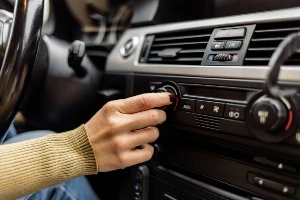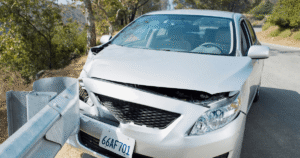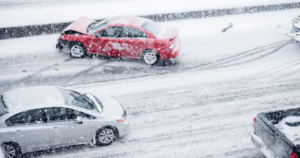Many drivers enjoy listening to music during their commute, but did you now that excessive volume levels can significantly impair your driving ability and increase the risk of a dangerous car crash?
Table of Contents
- Can Driving While Playing Loud Music Increase My Risk of a Crash?
- Is It Legal to Play Loud Music While Driving in South Bend?
- How Does Loud Music Affect My Ability to Drive?
- Can I Sue a Driver if They Hit My Car While Playing Loud Music in Indiana?
- Why Loud Music Playing Can Be Considered Distracted Driving
- Evidence That Can Show How Loud Music Contributed to My Car Crash
- Call Pfeifer, Morgan & Stesiak After You Have Been Involved in a Car Crash
At Pfeifer, Morgan & Stesiak, we understand the impact car accidents can have on injured victims and their families. Our experienced South Bend car accident attorneys help crash victims every day, and we are committed to helping you recover the maximum possible compensation for your damages.
Not sure if you have a case? Call our law offices today for a free case review. We can answer any questions you may have and help you understand your legal options.
Call Pfeifer, Morgan & Stesiak today to request a free consultation: (574) 444-0741.
Can Driving While Playing Loud Music Increase My Risk of a Crash?

Yes, driving with loud music significantly increases your crash risk by impairing your ability to hear critical safety sounds and process information while driving. Excessive volume levels can be just as dangerous as other forms of distracted driving, causing divided attention and delayed reaction times.
Is It Legal to Play Loud Music While Driving in South Bend?
South Bend does not have specific laws prohibiting loud music while driving. However, excessive volume can result in traffic citations under Indiana’s distracted driving, reckless driving, and noise ordinance laws.
Indiana law prohibits activities that distract drivers or endanger others. If loud music prevents you from hearing emergency vehicles or contributes to accidents, you face citations with fines up to $1,000 and potential license suspensions. Failing to yield to emergency vehicles due to loud music results in automatic citations and points on your driving record.
How Does Loud Music Affect My Ability to Drive?
Loud music significantly impairs your driving ability by interfering with critical cognitive functions, reducing reaction times, and blocking essential safety sounds. These effects increase crash risk and compromise your ability to respond effectively to traffic hazards.
- Cognitive Impact: Loud music splits your focus while you are driving, causing you to divide attention between sound and vehicle control.
- Loss of Critical Safety Sounds: Excessive volume masks emergency sirens, car horns, motorcycle engines, and environmental sounds, such as tire noise changes or engine strain.
- Physical Effects: Loud music creates physical tension in your body that makes it harder to control your car. Your steering becomes less accurate, and you cannot press the gas and brake pedals as smoothly as you normally would.
- Specific Situations: Highway merging becomes dangerous when you cannot hear vehicles in blind spots. Intersection navigation suffers when turn signals and pedestrian warnings are masked.
- Age-Related Impacts: Some young drivers already struggle with recognizing road dangers, and loud music exacerbates this problem. Older drivers may experience some hearing loss, finding it hard to hear sounds when music is playing loudly.
Can I Sue a Driver if They Hit My Car While Playing Loud Music in Indiana?
Yes, you can sue if you prove negligence. The success of your case depends on establishing that loud music directly contributed to the accident and your injuries.
You must demonstrate that excessive volume prevented the driver from exercising reasonable care. This is proven either by blocking warning sounds or impairing concentration. Courts evaluate whether the music volume caused a breach of duty that caused your damage.
Why Loud Music Playing Can Be Considered Distracted Driving
Loud music can legally qualify as a distraction under the principles governing cognitive distractions. Music becomes significantly distracting at volumes above 85 decibels, where cognitive interference becomes measurable and noticeable.
- Legal Standards: Distracted driving laws target activities that prevent reasonable care while driving.
- Court Recognition: Like cellphone use, excessive music volume creates measurable impairment courts use to establish negligence.
- Insurance Evaluation: Companies assess volume levels and driver behavior when determining fault and liability in claims.
Evidence That Can Show How Loud Music Contributed to My Car Crash
Loud music that contributes to your accident requires specific evidence that demonstrates the driver’s impaired ability to hear, react, or maintain attention. This evidence helps establish negligence and strengthens your personal injury claim.
- Physical Evidence: Crash scene investigators can take photos of the other driver’s stereo system settings and any extra speakers or amplifiers.
- Police Report Documentation: Police reports often note if loud music was still playing when officers got to the crash scene. Check if the driver received tickets for distracted driving or failing to yield to emergency vehicles.
- Technology-Based Evidence: Phone records can show music app usage during the crash. Some newer cars may save radio volume and audio source data.
- Witness Testimony: Other drivers who heard the music or saw the ignored warning signals provide valuable accounts.
- Reconstruction and Expert Analysis: Accident experts can determine if slow reaction times match loud music distraction patterns. Sound specialists can test the stereo system and estimate volume levels based on witness descriptions.
Call Pfeifer, Morgan & Stesiak After You Have Been Involved in a Car Crash
Loud music while driving creates preventable accidents that could lead to serious injuries and financial hardship for victims. When negligent drivers choose to blast their music at dangerous volumes, they put everyone on the road at risk and should be held accountable for the consequences.
If you or a loved one has been injured in an accident involving a distracted driver, the experienced attorneys at Pfeifer, Morgan & Stesiak are here to help. We offer free consultations, and if we move forward with your case, our firm does not charge any upfront cost for our legal services.
Learn more about your legal options today: (574) 444-0741.



